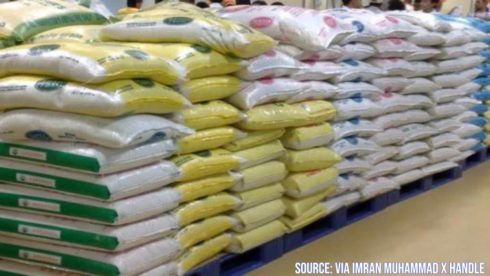In a bid to ease the burden of rising food prices, the Federal Government of Nigeria has commenced the sale of 30,000 metric tonnes of milled rice to citizens at a significantly reduced cost. Each 50-kilogram bag of rice will be sold for N40,000, a price far lower than the current market rate, making it more accessible to households across the country. This initiative is part of the government’s broader strategy to alleviate food insecurity and stabilize the market amidst economic pressures.
The distribution of the subsidized rice will take place in phases, targeting various regions to ensure even reach across Nigeria. This move comes as part of efforts to reduce the financial strain on Nigerians, particularly low-income earners, as inflation continues to impact essential commodities.
Federal Government: National Identification Number (NIN) Mandatory for Purchase
To streamline the distribution process and prevent fraud, the Federal Government has mandated that all prospective buyers must present their National Identification Number (NIN). This policy aims to ensure that the rice reaches legitimate buyers, preventing hoarding or the diversion of the subsidized rice to the black market. The use of NIN will also help authorities monitor the distribution and ensure fairness in the sales process.
Federal Government’s decision to use the NIN system reflects a growing trend toward digitizing public services in Nigeria. By leveraging the NIN, authorities can maintain a comprehensive database of recipients and avoid the logistical challenges seen in previous subsidy programs.
Federal Government’s Subsidized Rice: A Response to Rising Food Prices
The subsidized sale of rice is a direct response to the inflationary pressures that have plagued the Nigerian economy in recent months. The cost of staple foods, including rice, has risen sharply due to a combination of factors, including currency devaluation, global supply chain disruptions, and local production challenges. As rice is a staple food for millions of Nigerians, the government’s intervention is seen as crucial to protecting household food security.
Economists have lauded the move as timely, though some have raised concerns about its long-term sustainability. They argue that while this initiative provides short-term relief, addressing the root causes of food inflation requires more comprehensive agricultural reforms and improved local production capacity.
Regional Distribution Centers Established for Efficient Delivery
To ensure the rice is accessible to all citizens, the Federal Government has set up regional distribution centers across the country. These centers are designed to handle large volumes of rice efficiently and to coordinate with local governments to ensure fair distribution. The selection of these centers has been based on population density and proximity to key markets to maximize the reach of the subsidized rice.
Government officials have urged Nigerians to remain patient as distribution is rolled out in phases, emphasizing that the process has been structured to avoid congestion and ensure that all regions benefit from the initiative. Special attention is being given to vulnerable areas, particularly in rural communities where food insecurity is more acute.
Federal Government’s Monitoring Mechanisms to Prevent Black Market Diversion
In light of past incidents where subsidized goods were diverted to the black market, the Federal Government has implemented stringent monitoring mechanisms to ensure the rice reaches its intended recipients. Security forces and regulatory agencies will work in tandem to oversee the distribution process, ensuring that only verified NIN holders can purchase the rice at the subsidized rate.
This robust monitoring system is expected to discourage illegal activity and ensure that the subsidized rice is sold directly to consumers. Additionally, Federal Government has set up a feedback system to allow Nigerians to report any irregularities or misconduct observed during the distribution process.
Public Reactions and Expectations for Future Subsidy Programs
The announcement of the subsidized rice sales has been met with mixed reactions from the public. Many Nigerians have expressed relief, noting that the initiative will help ease the financial strain caused by rising food prices. However, others have voiced concerns about the availability of the rice and the potential for corruption in the distribution process, citing past challenges with similar subsidy programs.
Looking ahead, citizens and analysts alike are calling for the Federal Government to implement more sustainable measures to address food insecurity. While the current initiative is seen as a positive step, long-term solutions such as investments in local agriculture, enhanced food production, and improved infrastructure will be necessary to ensure lasting food security for all Nigerians.
Table of Contents
Discover more from OGM News NG
Subscribe to get the latest posts sent to your email.














